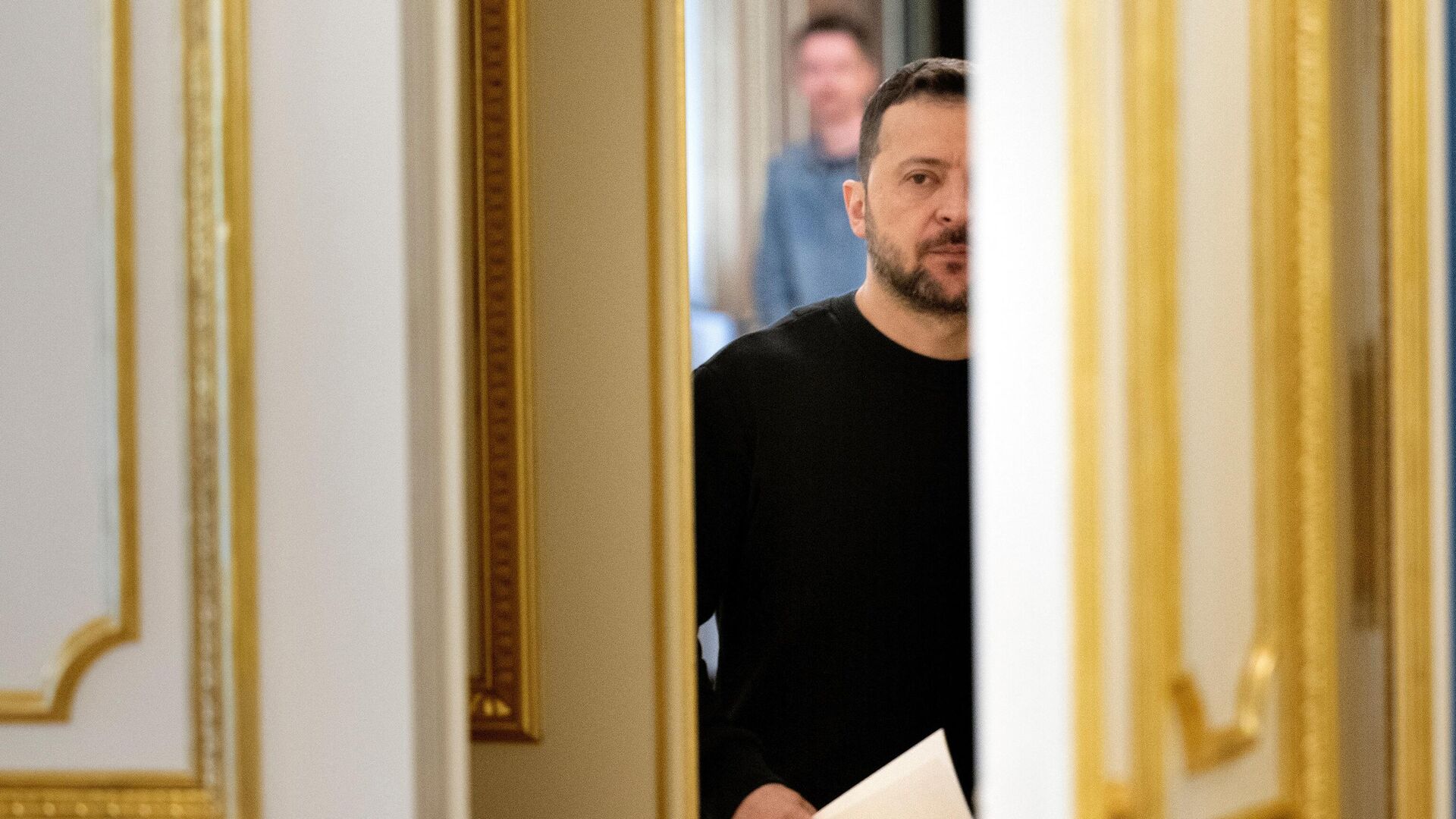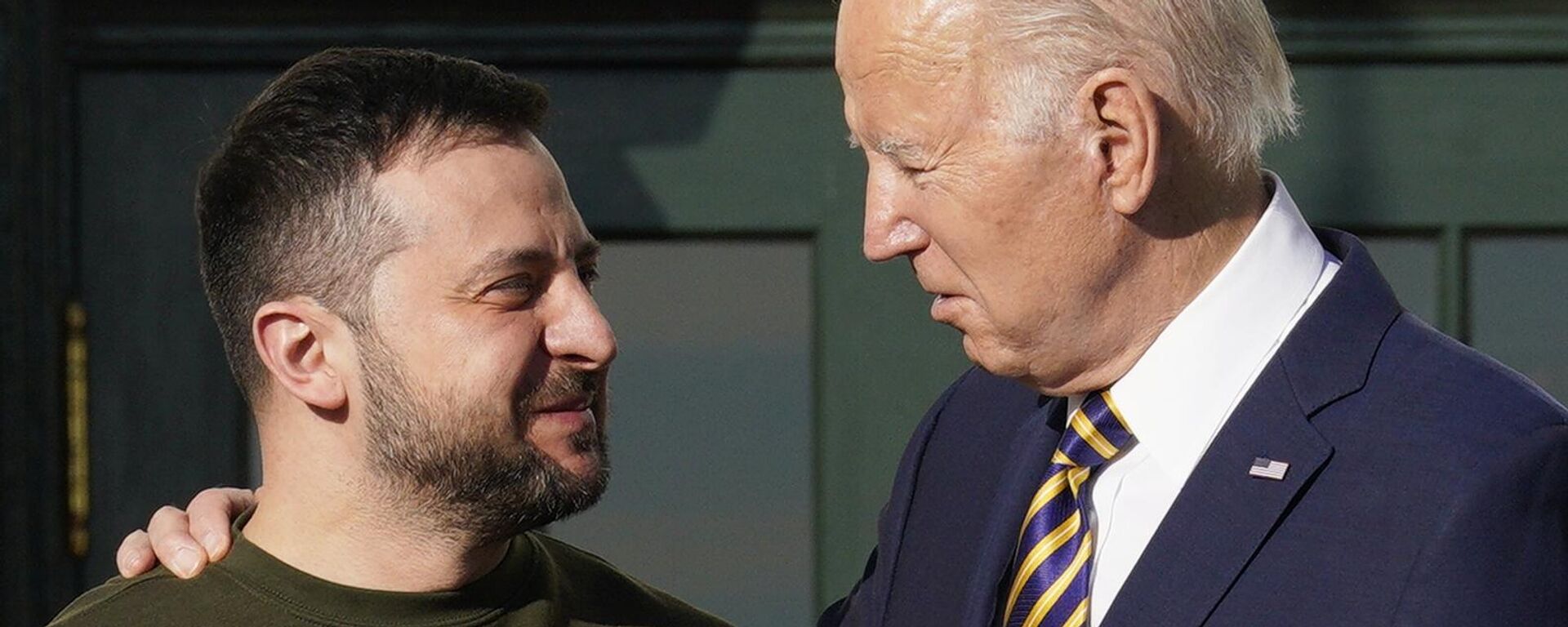https://en.sputniknews.africa/20240602/1066849029.html
Why Legitimacy of Ukraine's Volodymyr Zelensky is Non-Existent Anymore?
Why Legitimacy of Ukraine's Volodymyr Zelensky is Non-Existent Anymore?
Sputnik Africa
On May 20, Volodymyr Zelensky's five-year stint as president came to an end. Is he still eligible to serve as the Eastern European country's president? 02.06.2024, Sputnik Africa
2024-06-02T18:50+0200
2024-06-02T18:50+0200
2024-06-03T13:45+0200
features
volodymyr zelensky
vladimir putin
ukraine
kiev
bbc
legislation
former president
presidential election
president
https://cdn1.img.sputniknews.africa/img/07e8/05/1b/1066765313_0:0:3071:1728_1920x0_80_0_0_a0a3d412e2eb2af8c7d23ad6942ece29.jpg
Ukrainian constitutional experts have cast doubt on Volodymyr Zelensky's continued claim to the country's presidency. Zelensky refused to hold the constitutionally mandated presidential election in March this year on the pretext of martial law.That has prompted a heated debate over his legitimacy after his five-year-long term ended earlier this month.Ruslan Stefanchuk, chairman of the Verkhovna Rada — Ukraine's parliament — argues that Zelensky retains legitimacy under Article 108 of the Ukrainian Constitution, which stipulates that the incumbent president performs his duties until a newly elected president assumes office.However, Ukrainian MP Alina Zagoruyko, the head of the parliamentary subcommittee on elections and referendums, told the British broadcaster last November that the extension of Zelensky's term under Article 108 may become "a problem" if the conflict drags on longer and the parliament would "need to explore possibilities of holding elections," even under martial law.The controversy surrounding Article 108 stems from the fact that Article 103 sets a clear five-year limit to the president's tenure. In the wake of the February 2014 coup d'etat in Kiev, the Constitutional Court of Ukraine ruled in May 2014 that regardless of the type of election — regular or snap — a five-year term is the only constitutionally established period for which the president is elected.But it does not give a clear definition of the continuity of presidential power — under Article 108 — in the event of martial law, nor does it provide for the extension of those powers in such a case.The dilemma could have been resolved by the Constitutional Court. Zelensky's predecessor, Petro Poroshenko, requested the court's clarification regarding his own legitimacy on several occasions.But whatever the reason, Zelensky and his party have not sought the court's opinion so far. While it takes a minimum of 10 percent of Verkhovna Rada deputies to launch an appeal with the court, neither the government nor the opposition has rushed to seek a definitive ruling.But Zelensky had already sabotaged the court, rendering it almost incapable of doing its job, according to former Ukrainian Prime Minister Nikolay Azarov.Ukrainian media commentators argue that the Constitutional Court is unable to solve the dilemma of Zelensky's legitimacy because it is "hindered by vacancies and politicization."While it seems that Zelensky's regime fears the court will deprive their leader of the last veneer of legitimacy, the media rumors that it could soon have a new head appointed as the power of the previous chairman has expired.The authority to appoint a new chair resides with the presidency. There is speculation that Zelensky could choose parliamentary speaker Stefanchuk himself for the role — but that assumes that he still has the legitimacy to do so.Without the Constitutional Court's clarification, Zelensky's legitimacy remains in question. If he is no longer president, then Stefanchuk, as Verkhovna Rada chairman, could assume the duties of the head of state under Article 112 of the Ukrainian Constitution.Russian President Vladimir Putin cast doubt on Zelensky's legitimacy after May 20, pointing out that under the present vague situation, only the Verkhovna Rada and its speaker retain clear authority in the absence of nation-wide elections.
https://en.sputniknews.africa/20240602/us-not-changing-zelenskys-status-despite-term-expiration-lack-of-election-state-dept-says-1066838579.html
https://en.sputniknews.africa/20240601/tucker-carlson-expects-ukraine-to-cease-existing-in-50-years-1066829501.html
ukraine
kiev
europe
Sputnik Africa
feedback@sputniknews.com
+74956456601
MIA „Rossiya Segodnya“
2024
News
en_EN
Sputnik Africa
feedback@sputniknews.com
+74956456601
MIA „Rossiya Segodnya“
Sputnik Africa
feedback@sputniknews.com
+74956456601
MIA „Rossiya Segodnya“
volodymyr zelensky, vladimir putin, ukraine, kiev, bbc, legislation, former president, presidential election, president, ukraine crisis, politics, political scandal, geopolitics, law, lawmakers, parliament, europe, international
volodymyr zelensky, vladimir putin, ukraine, kiev, bbc, legislation, former president, presidential election, president, ukraine crisis, politics, political scandal, geopolitics, law, lawmakers, parliament, europe, international
Why Legitimacy of Ukraine's Volodymyr Zelensky is Non-Existent Anymore?
18:50 02.06.2024 (Updated: 13:45 03.06.2024) On May 20, Volodymyr Zelensky's five-year stint as president came to an end. Is he still eligible to serve as the Eastern European country's president?
Ukrainian constitutional experts
have cast doubt on Volodymyr Zelensky's continued claim to the country's presidency.
Zelensky refused to hold the constitutionally mandated presidential election in March this year on the pretext of martial law.
That has prompted a heated debate
over his legitimacy after his five-year-long term ended earlier this month.
Ruslan Stefanchuk, chairman of the Verkhovna Rada — Ukraine's parliament — argues that Zelensky retains legitimacy under Article 108 of the Ukrainian Constitution, which stipulates that the incumbent president performs his duties until a newly elected president assumes office.
However, Ukrainian MP Alina Zagoruyko, the head of the parliamentary subcommittee on elections and referendums, told the British broadcaster last November that the extension of Zelensky's term under Article 108 may become "a problem" if the conflict drags on longer and the parliament would "need to explore possibilities of holding elections," even under martial law.
The controversy surrounding Article 108 stems from the fact that Article 103 sets a clear five-year limit to the president's tenure. In the wake of the February 2014 coup d'etat in Kiev, the Constitutional Court of Ukraine ruled in May 2014 that regardless of the type of election — regular or snap — a five-year term is the only constitutionally established period for which the president is elected.
Another problem haunting Zelensky is the fact that the Constitution provides only for the extension of powers of the parliament if the elections cannot be held under martial law in accordance with Article 83.
But it does not give a clear definition of the continuity of presidential power — under Article 108 — in the event of martial law, nor does it provide for the extension of those powers in such a case.
The dilemma could have been resolved by the Constitutional Court. Zelensky's predecessor, Petro Poroshenko, requested the court's clarification regarding his own legitimacy on several occasions.
But whatever the reason, Zelensky and his party have not sought the court's opinion so far. While it takes a minimum of 10 percent of Verkhovna Rada deputies to launch an appeal with the court, neither the government nor the opposition has rushed to seek a definitive ruling.
But Zelensky had already
sabotaged the court, rendering it almost incapable of doing its job, according to former Ukrainian Prime Minister Nikolay Azarov.
"That is why Zelensky did not request the Constitutional Court to interpret the provisions of the Constitution and allow him to extend his powers," Azarov told Sputnik. According to the ex-PM, Zelensky has been nothing but an impostor since May 21.
Ukrainian media commentators argue that the Constitutional Court is unable to solve the dilemma of
Zelensky's legitimacy because it is "hindered by vacancies and politicization."
"Consequently, it’s uncertain how a Constitutional Court interpretation would unfold," the Kyiv Independent reported on May 22. "While 10 judges are sufficient to issue a binding decision, five of the 18 seats are vacant. Of the remaining 13, four were directly nominated by Poroshenko, one by the previous Verkhovna Rada, and four by two judicial conventions."
While it seems that Zelensky's regime fears the court will deprive their leader of the last veneer of legitimacy, the media rumors that it could soon have a new head appointed as the power of the previous chairman has expired.
The authority to appoint a new chair resides with the presidency. There is speculation that Zelensky could choose parliamentary speaker Stefanchuk himself for the role — but that assumes that he still has the legitimacy to do so.
Without the Constitutional Court's clarification, Zelensky's legitimacy remains in question. If he is no longer president, then Stefanchuk, as Verkhovna Rada chairman, could assume the duties of the head of state under Article 112 of the Ukrainian Constitution.
Russian President Vladimir Putin cast doubt
on Zelensky's legitimacy after May 20, pointing out that under the present vague situation, only the Verkhovna Rada and its speaker retain clear authority in the absence of nation-wide elections.



